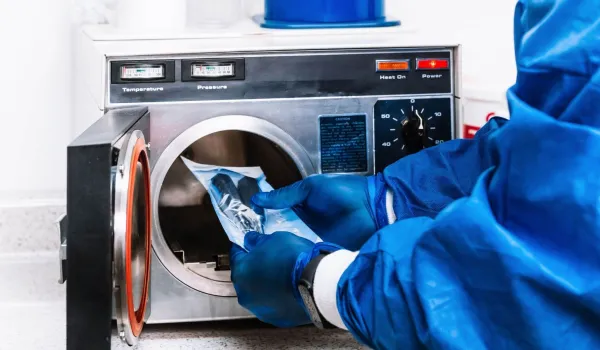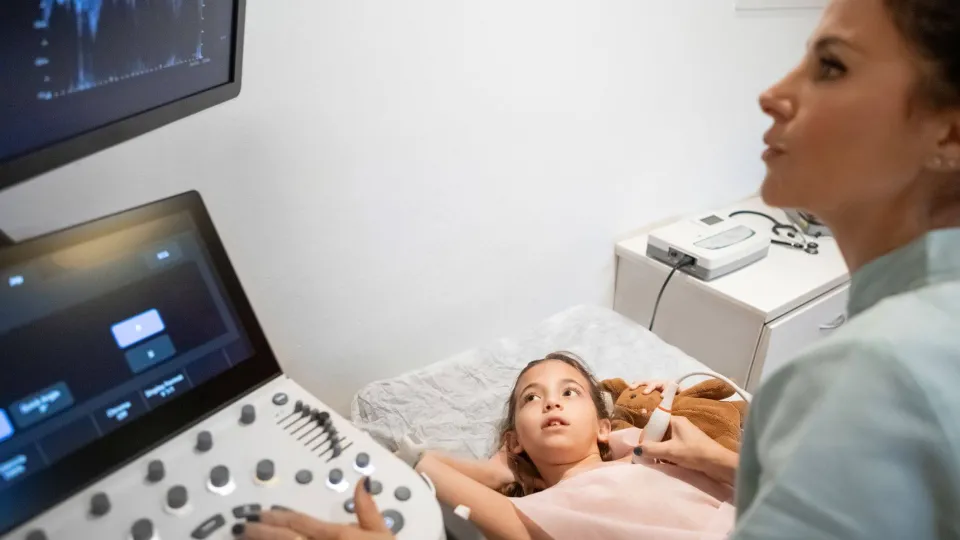
Cardiovascular sonographers use advanced ultrasound technology to help diagnose and treat heart and blood conditions. By creating detailed images of the heart and vascular system, these professionals detect cardiovascular abnormalities and assist doctors with treatment plans. Since heart disease is the leading cause of death worldwide, this field is growing rapidly, with an 11% employment increase projected from 2023 to 2033. This is faster than the average employment rate for other occupations.
If you're interested in a career that allows you to work directly with patients while also focusing on technical aspects such as ultrasound imaging, this may be a field for you to consider. Plus, with the rapid evolution of new cardiovascular technologies and diagnostic tools, you'll always have something new to learn. This article explores what cardiovascular sonographers do, where they typically work, and how to become one.
Job Duties and Responsibilities
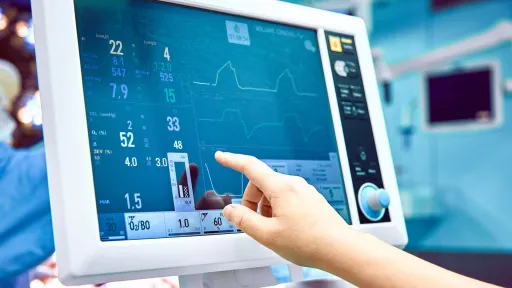
Related: 6 New and Emerging Trends in Cardiac Sonography and Diagnostic Imaging
Cardiovascular sonographers are essential members of the healthcare team. While their primary focus is on using imaging technology to help physicians accurately diagnose heart conditions, they have several responsibilities, including:
- Preparing patients and explaining procedures to help them feel comfortable
- Operating specialized ultrasound equipment to capture clear images of the heart and blood vessels
- Analyzing images for abnormalities to identify potential issues
- Recording findings and preparing detailed reports for physicians
- Maintaining and calibrating equipment to provide accurate diagnostics
- Collaborating with healthcare team members for comprehensive patient care
- Reviewing images and test results for quality and accuracy
- Providing a summary of findings to physicians for diagnostic purposes
- Keeping detailed patient records to track progress and treatment outcomes
Types of Cardiovascular Sonography
Cardiovascular sonography encompasses several specializations, each focusing on specific areas of the heart and blood vessels:
- Adult echocardiography: Uses ultrasound to capture detailed images of the adult heart's chambers, valves, and vessels to help diagnose and monitor conditions such as heart disease and valve disorders.
- Pediatric echocardiography: Specializes in imaging the hearts of infants and children, identifying congenital heart defects or other structural abnormalities that may affect younger patients.
- Fetal echocardiography: Focuses on assessing the heart health of fetuses during pregnancy, allowing for early detection of congenital heart conditions.
- Vascular sonography: Creates images of veins and arteries to diagnose issues such as blood clots, aneurysms, or blockages, supporting comprehensive cardiovascular health management.
It's also worth noting that several emerging technologies in cardiovascular sonography make this an exciting field to explore, including:
- Contrast-enhanced ultrasound: Combines ultrasound with a special contrast agent, providing clearer images of blood flow and heart tissues for more precise diagnostics.
- 3D and 4D ultrasound technology: Produces multidimensional images, enabling more detailed visualization of heart structures and real-time video imaging.
- Point-of-care ultrasound: Portable devices allow sonographers to perform immediate diagnostics in varied healthcare settings.
- Telecardiology: Uses teleconferencing to transmit ultrasound data for remote analysis, expanding access to specialized care and consultations.
Work Environment
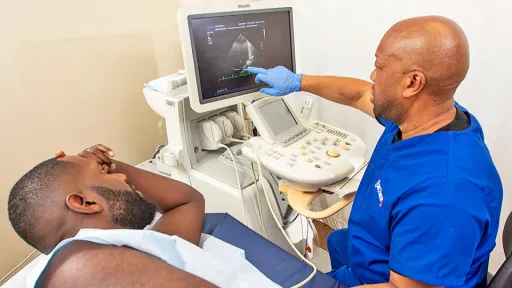
Related: How To Become a Cardiac Sonographer: Requirements, Duties, and Outlook
While most cardiovascular sonographers work in hospitals where they assist with emergency and routine procedures, they may work in a variety of healthcare settings, including:
- Outpatient clinics: Sonographers at these facilities provide specialized imaging services to patients who don't need to be admitted into hospitals for care.
- Diagnostic imaging centers: These cardiovascular sonographers focus on scheduled imaging services and often enjoy a more predictable environment.
- Physicians' offices: Sonographers who work in physicians' offices typically perform imaging tests as part of routine cardiac care.
- Mobile imaging services: Perfect for sonographers who enjoy traveling, these professionals go to different locations to provide flexible imaging options.
Sonographers often stand for long periods and may need to lift or turn patients, which requires physical strength and endurance. They spend a good portion of their workdays in dimly lit rooms to operate imaging equipment. Full-time work is common, though part-time options exist for professionals seeking greater work-life balance. However, evening, weekend, and on-call shifts are always a possibility, especially in busy hospital settings.
Education and Training
If you're interested in becoming a cardiovascular sonographer, follow these steps to get started:
- Complete high school or earn your GED. Focus on courses such as anatomy, physiology, math, and physics to build a solid foundation for advanced studies.
- Earn an associate or bachelor's degree in cardiovascular sonography. Choose a Cardiovascular Sonography program or Echocardiography program that offers a mix of classroom learning and hands-on clinical training.
- Complete clinical training. Most Cardiovascular or Echocardiography programs require students to gain supervised, real-world experience to refine their skills.
- Consider professional certification. Obtain credentials such as the Registered Diagnostic Cardiac Sonographer from the American Registry for Diagnostic Medical Sonography or Cardiovascular Credentialing International through cardiac sonographer certification programs. Certification is often preferred and sometimes required by states or employers.
- Pursue continuing education. Maintain your certification and stay current with evolving technologies by completing ongoing education.
It's also important to note that some states require additional licensure, so make sure to research the specific laws in the state where you plan to practice.
Skills and Qualities
Successful cardiovascular sonographers rely on a combination of technical expertise and soft skills to accomplish their daily tasks. Here are some of the skills and qualities that might help you excel in this role:
- Attention to detail: Paying close attention to detail helps sonographers identify subtle abnormalities when reviewing diagnostic results.
- Physical stamina and hand-eye coordination: Sonographers often stand for long periods of time, lift and turn patients, and maneuver equipment, which requires strength, stamina, and hand-eye coordination.
- Technical proficiency with ultrasound equipment: Cardiovascular sonographers need to have experience operating and maintaining complex ultrasound machines to capture accurate images.
- Interpersonal skills: Being able to communicate clearly and build trust with patients makes it easier to explain procedures, convey important information, and create a comfortable space.
- Critical thinking: Sonographers must quickly assess imaging results, troubleshoot issues with ultrasound equipment, adapt to new technologies, and make adjustments as needed.
- Ability to work independently and in teams: Cardiovascular sonographers collaborate with other healthcare providers to diagnose patients, but they also need to be able to manage their daily tasks autonomously.
- Emotional stability: Skilled sonographers handle stressful situations with grace and show empathy to support patients dealing with health challenges.
Career Outlook
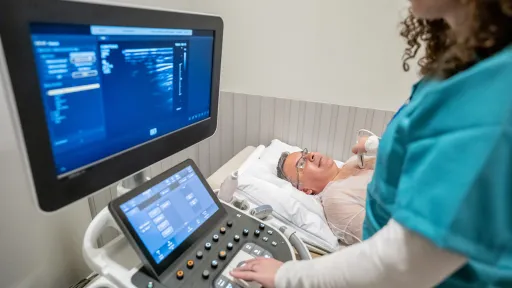
Related: 10 Reasons To Train for a Career in Cardiovascular Sonography
Employment for cardiovascular sonographers is expected to grow 11% from 2023 to 2033, which is faster than the average rate for all occupations. This demand is driven by an aging population, making a career in sonography a stable choice. The need for sonography and cardiovascular imaging is also expected to rise as the prevalence of heart disease grows.
Advancement Opportunities
Skilled cardiovascular sonographers have ample opportunities to advance throughout their careers, especially if they continue their education. Many sonographers specialize in a specific area by pursuing advanced certifications in adult, pediatric, or fetal echocardiography. Other popular advancement opportunities include:
- Supervisory and management positions: Experienced sonographers may move into leadership roles, such as department manager, technical director, or lead sonographer.
- Training and education: As a teacher or trainer, they may share their expertise and help aspiring sonographers begin their careers.
- Equipment manufacturer and sales roles: There are plenty of options to work as a sales representative or application specialist for ultrasound equipment companies.
- Research and development: Sonographers who work in R&D develop new imaging technologies and techniques.
- Healthcare administration: Sonographers who want to focus on managing healthcare systems on a bigger scale may move into healthcare administration roles.
Cardiovascular conditions continue to be a leading health concern, increasing the demand for skilled sonographers and making this a rewarding career path for aspiring healthcare professionals. With technological advancements such as artificial intelligence, 3D and 4D imaging, and machine learning rapidly changing the field, there are plenty of opportunities to learn, grow, and advance as a cardiovascular sonographer.
Pursuing continuing education credits, earning advanced certifications, and staying informed about these new developments is a smart way to set yourself up for a successful career. If you're searching for "cardiovascular sonographer programs near me," explore Concorde Career College's Cardiovascular Sonography Associate Degree Program, available at select Concorde campuses, to earn a degree in as few as 20 months of study. With real-world training and off-site clinical experiences included in our curriculum, enrolling in this comprehensive program is the perfect way to begin training for your professional healthcare journey. Please check with your local campus for program availability and requirements.
Vaduganathan, M., Mensah, G., Varieur Turco, J., Fuster, V., & Roth, G. A. (2022, December). The Global Burden of Cardiovascular Diseases and Risk: A Compass for Future Health. Journal of the American College of Cardiology. https://www.jacc.org/doi/10.1016/j.jacc.2022.11.005
U.S. Bureau of Labor Statistics. (2024f, August 29). Diagnostic medical sonographers and Cardiovascular Technologists and technicians. U.S. Bureau of Labor Statistics. https://www.bls.gov/ooh/healthcare/diagnostic-medical-sonographers.htm#tab-1
U.S. Bureau of Labor Statistics. (2024f, August 29). Diagnostic medical sonographers and Cardiovascular Technologists and technicians. U.S. Bureau of Labor Statistics. https://www.bls.gov/ooh/healthcare/diagnostic-medical-sonographers.htm#tab-6
Take The Next Step Towards a Brighter Future
Interested in learning more about our Cardiovascular Sonography program?
We have a Concorde representative ready to talk about what matters most to you. Get answers about start dates, curriculum, financial aid, scholarships and more!






